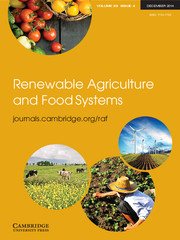Article contents
Municipal solid waste composting: Application as a tomato fertilizer and its effect on crop yield, fruit quality and phenolic content
Published online by Cambridge University Press: 31 August 2016
Abstract
Composting is an appealing way to reutilize the organic fraction of municipal solid waste (MSW). Beyond the obvious advantage of reducing urban waste, the use of MSW compost in agriculture entails other potential benefits, such as reducing the amount of mineral fertilizer applied to the field and providing a potentially higher quality alternative. However, some concerns may arise from its use, such as crop yield and quality alterations. This work studied the effect of fertilizing with compost obtained from the organic fraction of MSW, on crop yield, crop quality and phenolic content of tomato fruit. Experiments were conducted in the Barcelona area, using Solanum lycopersicum L., var. ‘Penjar’, a popular regional tomato. Compared with the use of mineral fertilizer (M), fertilization with MSW compost alone (C) or combined with mineral fertilizer (C + M) had no significant effect on tomato fruit quality characterized by weight, diameter or Brix, nor was there a significant effect on total phenolic content. In contrast, the C treatment altered the phenolic profile by enhancing a kaempferol derivative, and caused a 43 and 48% yield reduction compared with the C + M and M treatments, respectively. Overall, composted MSW + mineral fertilizer appeared to be the best strategy for the reutilization of MSW in tomato culture, as it did not compromise crop yield or fruit quality.
Keywords
- Type
- Research Papers
- Information
- Copyright
- Copyright © Cambridge University Press 2016
Footnotes
Present address: Food Technology Department, Agrotecnio Research Center, University of Lleida, Alcalde Rovira Roure 191, 25198 Lleida, Spain.
References
- 12
- Cited by



